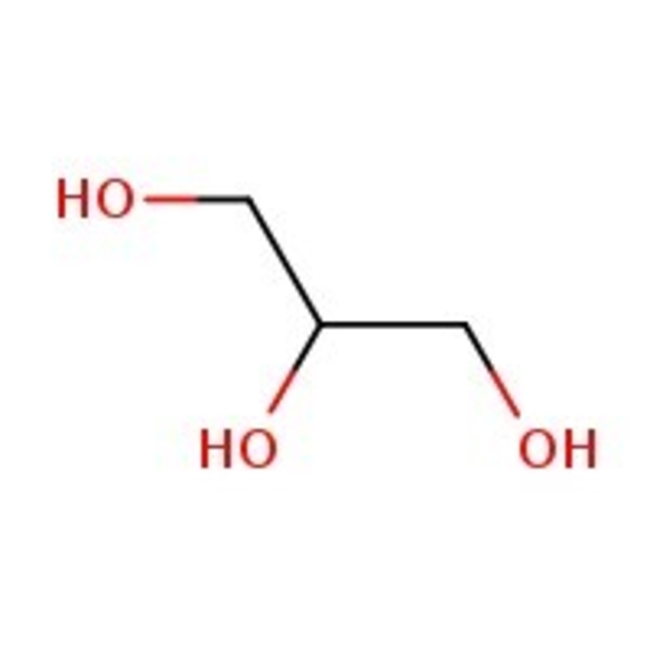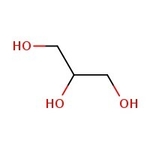Search Thermo Fisher Scientific
Thermo Scientific Chemicals
Glycerol, 99+%, Thermo Scientific Chemicals
CAS: 56-81-5 | C3H8O3 | 92.09 g/mol
Catalog number ALFA16205.AP
View Price:Sign InSign in to see your account pricing. Need an account? Register with us today.
Quantity:
500 mL
Specifications
Chemical Name or MaterialGlycerol
CAS56-81-5
Health Hazard 1Warning
Health Hazard 2GHS H Statement
H319
H319
Health Hazard 3GHS P Statement
P280-P264-P305+P351+P338-P337+P313
P280-P264-P305+P351+P338-P337+P313
View more
Glycerol is used as a solvent, sweetener, preservative, antifreezing agent, thickening agent in liqueurs and humectants in the food industry. It is also used in the preparation of pharmaceutical and personal care products, thereby improving the smoothness and provides lubrication. It is an active component in glycerin soap. It finds application in cough syrups, elixirs and expectorants, toothpaste, soaps, mouthwashes, skin care products, shaving cream, hair care products, and water-based personal lubricants. It is used as a starting material for the preparation of nitroglycerin, allyl iodidie, epichlorohydrin and glycerine acetate. In medical field, it is also used as a laxative and a temporary reduction in the internal pressure of the eye. In addition to this, it is involved to aid in casting gradient gels, protein stabilizer and storage buffer component.
This Thermo Scientific Chemicals brand product was originally part of the Alfa Aesar product portfolio. Some documentation and label information may refer to the legacy brand. The original Alfa Aesar product / item code or SKU reference has not changed as a part of the brand transition to Thermo Scientific Chemicals.
Applications
Glycerol is used as a solvent, sweetener, preservative, antifreezing agent, thickening agent in liqueurs and humectants in the food industry. It is also used in the preparation of pharmaceutical and personal care products, thereby improving the smoothness and provides lubrication. It is an active component in glycerin soap. It finds application in cough syrups, elixirs and expectorants, toothpaste, soaps, mouthwashes, skin care products, shaving cream, hair care products, and water-based personal lubricants. It is used as a starting material for the preparation of nitroglycerin, allyl iodidie, epichlorohydrin and glycerine acetate. In medical field, it is also used as a laxative and a temporary reduction in the internal pressure of the eye. In addition to this, it is involved to aid in casting gradient gels, protein stabilizer and storage buffer component.
Solubility
Miscible with water and alcohol. Partially miscible with ether and ethyl acetate. Immiscible with chloroform.
Notes
Hygroscopic. Incompatible with perchloric acid, lead oxide, acetic anhydride, nitrobenzene, chlorine, peroxides, strong acids and strong bases.
Glycerol is used as a solvent, sweetener, preservative, antifreezing agent, thickening agent in liqueurs and humectants in the food industry. It is also used in the preparation of pharmaceutical and personal care products, thereby improving the smoothness and provides lubrication. It is an active component in glycerin soap. It finds application in cough syrups, elixirs and expectorants, toothpaste, soaps, mouthwashes, skin care products, shaving cream, hair care products, and water-based personal lubricants. It is used as a starting material for the preparation of nitroglycerin, allyl iodidie, epichlorohydrin and glycerine acetate. In medical field, it is also used as a laxative and a temporary reduction in the internal pressure of the eye. In addition to this, it is involved to aid in casting gradient gels, protein stabilizer and storage buffer component.
Solubility
Miscible with water and alcohol. Partially miscible with ether and ethyl acetate. Immiscible with chloroform.
Notes
Hygroscopic. Incompatible with perchloric acid, lead oxide, acetic anhydride, nitrobenzene, chlorine, peroxides, strong acids and strong bases.
RUO – Research Use Only
General References:
- Morales, M.; Dapsens, P. Y.; Giovinazzo, I.; Witte, J.; Mondelli, C.; Papadokonstantakis, S.; Hungerbuhler, K.; Ramirez, J. P. Environmental and economic assessment of lactic acid production from glycerol using cascade bio- and chemocatalysis. Energy Environ. Sci. 2015, 8 (2), 558-567.
- Bagheri, S.; Julkapli, N. M.; Yehye, W. A. Catalytic conversion of biodiesel derived raw glycerol to value added products. Renewable Sustainable Energy Rev. 2015, 41, 113-127.



